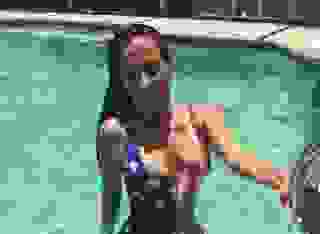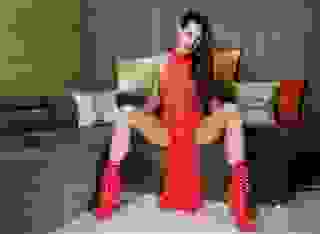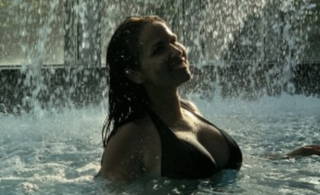- Romance
- Journal of Desire Ch. 01
Note: You can change font size, font face, and turn on dark mode by clicking the "A" icon tab in the Story Info Box.
You can temporarily switch back to a Classic Literotica® experience during our ongoing public Beta testing. Please consider leaving feedback on issues you experience or suggest improvements.
Click hereThe black stretch limousine bearing the plates of a U.S. senator eased around the traffic circle at the center of Temperance Hill.
Sen. Helene Falkland picked up the limo's intercom to buzz her chauffeur.
"Use the bank president's parking space," Helene said. "He's expecting me."
The chauffeur nodded, glancing in the rear view mirror. She was beautiful. The clean classic lines of a young Ingrid Bergman. The cool aloofness of a Greta Garbo. He turned off his thoughts. The parking space was just ahead on the right.
Senator Falkland handed the sheaf of papers to her aide.
"Stay by my side, Jeff. I don't want to fumble around for figures when I need them."
Jeff patted his bulging briefcase. "We're all set, senator. Every thing's cross-indexed like you wanted."
"The daughter is here, right?"
"Robyn Dunmore came for her father's funeral," Jeff said. "She thinks this board meeting is just an official condolence from the newspaper corporation."
"The editor's son hasn't shown up?" Senator Falkland glanced at her notes. "He's the one with experience."
Jeff wrinkled his nose. "He won't come. I lost track of him after he was run out of town. Took to the bottle as he bounced from one paper to another."
"Then if the girl's the key to it, I'm ready."
"You're ready, senator," Jeff said with a wink. "After three terms in office, you're ready to give the newspaper it's comeuppance."
Helene Falkland touched Jeff's hand. "Not just my political career," she said. "This is the payoff for three generations of Falklands."
Jeff watched Helene's firm buttocks twist smoothly in the black silk dress as she stepped out of the limo. He noted the way Helen's shapely legs filled out the silk hose.
There was a standing joke among the other senators about the special initial license plate on Helene's limo. "HF" didn't stand for Helene Falkland, the joke said. It really meant Helene Fucks.
Jeff smiled. The joke wasn't just a sexual innuendo. It was a warning. Mess with Senator Helene Falkland and you'll get screwed.
He had followed that fabulous body around every day for twelve years. Yet he still fantasized about his boss. But he knew she would bust the balls of the man who dared to crack that frozen exterior.
Helene leaned back into the limo.
"Get your ass in gear," she barked at Jeff. "I'm finally gonna pluck the feathers off this barnyard newspaper."
Jeff was opening the door of Guaranty Bank when he glanced across the street to the cemetery on the hill. He nudged the senator. They watched Robyn Dunmore take off her dress shoes and walk barefoot to the grave of her father who was editor of the Temperance Hill Journal. Jeff glanced at Helene Falkland. For the first time in months, he saw the senator smile.
Helene turned on her heels, and with Jeff trailing behind her, stalked into the bank.
"That girl," Helene whispered, "doesn't stand a fuckin' chance."
At the cemetery, Robyn Dunmore paused at her father's grave. Just two days ago, she had followed her father one last time to his favorite spot, this emerald green hill above the town. It was a large funeral that surprised the townsfolk. Even the state governor came, bearing official condolences from the speaker of the State House, and even the President of the United States.
"The influence of this small town editor reached even to the White House," the governor had said.
Golden dots of late autumn sunshine sparkled through the trees on the hill, healing the fresh brown wound in the earth. My father has been slipped into this tiny envelope of earth and sealed away forever, Robyn thought.
A warm breeze brought the soothing familiar fragrance of the harbor nestling at the foot of the hill. Now her father would forever keep watch over his beloved town below, just as his newspaper had kept vigil through the good and lean years.
As a barefoot child, her father had brought her up this hill, first on his strong shoulders, then hand-in-hand when her coltish legs grew stronger. He taught her to love this hill which blocked out the northern gales in winter, and replenished the town's wells during the spring runoff.
"This hill stands guard over the town," her father would say with a sweep of his massive ink-stained arms. "And The Journal must always stand guard over its people."
As Robyn's limbs lost their baby fat and curved into adolescence, he taught her to love The Journal. Grudgingly at first, Robyn spent her afternoons in the printing plant. She took delight in learning the mysteries of type fonts and standing spellbound before the clattering Linotype machine that cast the type into metal lines.
While her high school classmates gathered around the jukebox at Spivey's Soda Shop after school, Robyn explored the inky bowls of the Journal's 16-page Goss press as seriously as a surgeon probed the heart.
At the end of a hard day, her father would push her towards the men's room – the only restroom for the all-male press staff – with orders to scrub the ink off her cheeks and comb the lint of newsprint from her golden curls. Then he would send her off to cover a town council meeting. More than one of her teachers looked at her fingers stained yellow by film developing chemicals and accused her of smoking.
"A small town newspaper is the best classroom in the world," her father said. The best classroom in the world. Robyn hoped she would remember the lessons.
Now she was alone. As the sun rose higher in the blue sky, a breeze swirled through her ash blonde hair. She bent down to slip on her dress shoes, then started down the hill. The newspaper board was finally going to honor her father's work. She didn't want to miss it.
In the conference room, a knot well-dressed men opened a path as Senator Helene Falkland entered. They quickly swarmed around her. She turned to the county superintendent of education.
"Be a dear, Jay, and get me a chair."
She settled into the cushioned executive chair as the mayor pulled up his chair beside her. Helene opened a silver case and took out a cigarillo. Mayor Conners fumbled for his gold lighter and cleared his throat.
"How are things on the Hill, senator?" Mayor Conners pushed a massive crystal ashtray toward her.
Helene took a swift puff and put the cigarillo aside. "Not now, mayor. We'll talk politics at lunch. Excuse me a moment, darling. I must get with Huey for a moment."
Helene greeted Huey Lewis, the town banker, with pecks on both cheeks. That always softened him up.
"Huey, dear, we must try to help that poor newspaper out now that the dear editor has passed away. Why, his little girl just won't be able to make a go of it. She's had her head in computer science and all."
The banker raised an eyebrow.
"Why, senator. That's the first kind thing I've ever heard a Falkland say about the Dunmore clan. Don't tell me that old feud is finally over."
"The is not the time for me to seem unkind," Helene said. "That little girl just needs a little help."
Huey narrowed his gaze. "What's on your mind, senator?"
Helene glanced off in the distance for a moment as if she was trying to think,
"Well, your bank," she said, "is holding a note her dad signed five years ago. Do tell me he was able to pay it off."
"Now Helene, you know I can't discuss a customer's business. Privacy laws and all that."
The senator bit her lower lip.
"Mr. Lewis, you know there's some important banking legislation before my committee. Perhaps I should delay the hearings till I've read and studied, studied mind you, all two thousand and thirty seven pages. Yes, I need to study that bill line by line.'
A serious look crossed her face.
"Guess you'll have to tell your banking association that it might not get all those loopholes this year." Helene paused. "Yes, you just tell them your own hometown senator put on the brakes. It'll be a shame, with you running for association chairman and all."
Huey Lewis closed his eyes for a moment.
"Since you're seeking sensitive information because you have the daughter's interest at heart, I do recollect that editor's loan. There are some things that are a little messy about it, though."
Helene smiled. "I believe we understand each other, Huey."
She looked across the table as Robyn Dunmore took a seat. This thorn in her side had been festering since childhood. Robyn Dunmore, descendant of the family that had ruined her great-grandfather over the state's last duel.
"Sorry I'm a few minutes, late," Robyn said as she gasped for breath.
The chairman shuffled his papers. He looked at Senator Falkland, then at Robyn Dunmore.
"Can you run the newspaper, Miss Dunmore?'
The question startled Robyn. She saw the seven men around the massive oak conference table look at her expectantly. They were the town's leading businessmen. Bankers. Lawyers. Merchants. Accountants. And they were clearly looking to her for help.
Robyn brushed at the imagined lint on the skirt of her tailored black suit. She struggled to suppress the slight tremor in her throat.
"Of course I always helped Dad after school," Robyn admitted. "But that was years ago."
Through the tall windows of the bank's huge conference room, Robyn could see the newspaper office on the north corner of the town square. The familiar lettering on the sign was now faded. "The Journal," it said simply. It was a shock to return to the small town after ten years. The proud building sagged on its foundation, like an aging man long neglected.
The bank president coughed loudly.
"Unless you can run the newspaper," he said impatiently, "I must make a motion that we accept the offer to sell The Journal."
Robyn stiffened. A chill touched her spine.
"We've just buried my father," she said. "Now you're rushing to hold a wake for his newspaper, too."
The lawyer, Everett Berry, shifted uneasily in his cushioned executive chair.
"No need to be melodramatic,:" Everett Berry said. His face flushed with embarrassment. "We're not burying The Journal," he said a little too loudly. "Although that might be the kindest thing to do."
Berry picked up the the auditor's quarterly report. "As corporate directors of your father's paper, we must admit that there's not much meat on the newspaper's bones."
Robyn's brown eyes changed from the moist softness of grief to the coldness of sudden anger, stabbing at the men around the table. Her eyes swept across their heavy jowls, their jeweled rings on well manicured fingers, their tailored silk suits that her father could never afford, not even in death. Looking at them, Robyn remembered her father's years of struggle with the small town paper.
Now the fate of The Journal rested with these men. These button-downed counters of profit and loss. Readers of balance sheets. Gossipers of net worth. Not one of them a journalist. Yet for three hours they had talked as if a newspaper was just another corner gas station.
"Miss Dunmore?"
This time the bank president took his silver ball point pen and made an irritable tap on the hard table. "You have to admit that we have a generous offer from Global News Media. We must do what's best."
"But why," Robyn said. She struggled to keep her voice from trembling with rage. "Why sell to that monster conglomerate?"
The legs of her chair protested against the marble floor as she suddenly stood to challenge these men who held power over her father's paper. She pointed to the framed front pages of The Journal dominating the dark paneled walls.
"The Journal has been the local paper for over a hundred years," Robyn said. She walked behind the bank president's seat and tapped the glass protecting the yellowed paper. "Here's the first edition. Look at the headline: 'Town Limits Established.' Have you forgotten that this town and the newspaper were born on the same day?"
Craning their necks, the men glanced from one framed copy of the paper to another. The Journal recorded the town's growth from a wilderness trading post to the state's agricultural center.
"Another thing," Robyn continued, "why hasn't Global Media presented its offer in person. Is it's far-flung operation so big that The Journal is just another small pebble that can be scavenged by long distance?"
"Jonathan Corsair, the publishing magnate," said the bank president in a tone that implied it was one of the 10 Commandments, "rarely appears in public." He seemed astonished that Robyn wasn't aware of that. "Mr. Corsair seldom ventures outside his compound in Key West."
The men fidgeted uneasily as Robyn stood her ground.
"That proves my point," Robyn said. "A newspaper, a small town newspaper, can't be managed by long distance."
Her voice was firm. Gone were the tears of mourning.
"If Jonathan Corsair is too busy to buy this paper in person, where will he be when we really need him?"
Senator Helene Falkland cut in.
"Mr. Corsair is an outstanding businessman who will head up the paper. I picked him myself."
Robyn Dunmore noticed Helene Falkland for the first time.
"What is the senator doing here," Robyn demanded. "This is a board meeting for the Journal stockholders. My dad didn't sell any stock to the Falklands."
Helene Falkland turned to Dr. Hawthorne. He nodded and stood up.
"I'm sorry I forgot to tell you, Miss Dunmore," Dr. Hawthorne said. He smiled. "When your dad took ill a month ago, I sold some of my stock to the senator. She has some ideas about the Journal being more involved in community work. Voter registration and more involvement with our elected representatives."
Robyn grimaced. "Political meddling in the newspaper, you mean."
The lawyer Everett Berry suddenly rattled the auditor's report. "I'm afraid I must agree with Miss Dunmore," he said. "I think we should see who we're dealing with."
Robyn checked her wrist watch.
"Since there's no one here to present the Global Media offer in person, we're wasting our time," she said.
Only two days since her father's funeral and already her world was threatening to turn upside down.
"You gentlemen did ask if I could run the paper," Robyn said. "Well, I can. And I will!"
"One moment, Miss Dunmore." The bank president smiled for the first time. "I thought you might insist on personal negotiations." He pressed a button on the table intercom. "Jonathan Corsair arrived in his personal jet this morning."
The door swung open. It seemed almost too small for the muscular frame of Jonathan Corsair. His hard body, vibrating with energy, towered over everyone as they stood to greet him. Robyn had to arch her neck to see the steady gaze of his cobalt blue eyes. He must be six feet tall, Robyn thought. His sunburst hair was cropped close with a few wild strands defiant against sun-bronzed skin.
Suddenly Robyn's legs were as sturdy as pudding. He was ruggedly handsome. And infuriatingly arrogant.
Robyn shook her head and realized that the bank president was speaking again. He droned on, talking piously about community welfare and public trust.
This banker, Robyn remembered sourly, had refused her dad a bank loan to modernize the newspaper plant. The bank finally made a loan, but it was too little, too late, and with a high interest rate.
The other community leaders fidgeted in their seats. But Robyn noticed that Jonathan Corsair was busy establishing his power.
When the man across from him leaned forward, Jonathan would slide a briefcase toward the other man. The other man leaned back in his chair because now there was less table space in front of him.
Robyn realized with a shock that Jonathan Corsair had quietly staked out a larger table domain for himself. This was a board room shark used to getting his own way.
Jonathan Corsair was well groomed. But it's not the expensive cut of his clothes that made him stand out, Robyn decided. It was his self assurance that made the small town businessmen seem pretentious.
Robyn could spot the local trend setters around the table. They flaunted their designer shirts and ties, their trendy trousers and Italian shoes. They were trying too hard to appear the big frogs in a small pond. They wore their clothes like peacocks.
But it was the force of Jonathan's personality that almost took Robyn's breath away. Robyn had to force herself to look away from this unsettling man. This man had an inner fire that blazed too bright. Here was a man who was dangerous.
Robyn tensed when Jonathan rose to speak. She couldn't believe the gall of his first words.
"Running a newspaper is not a job for an amateur," Jonathan Corsair said. "It'll be best to fly in one of my reporters a couple days a week."
"Two days a week!" Robyn's cheeks flushed with indignation. Strength returned to her legs. Her shoe tapped angrily on the marble floor.
"Two days a week," Robyn fairly stammered. "Well, this isn't Miami or New York, Mister Big Time Publisher! We don't have Associated Press wire machines pouring out tons of copy from Outer Nowhere to fill our newspaper."
Is this guy for real, Robyn wondered?
"Didn't your henchmen tell you this is a small town? Folks around here read this paper. Cover to cover. This small town paper is their backyard fence for the latest local news.
"They check to see if we know something they don't know, and if we've got the guts to print it."
Robyn took a deep breath to calm down.
"Nothing is closer to people in a small town than its newspaper," she said. "Maybe in some place like New York they'll call the paper THE Times, but here in Hometown, U.S.A., folks say OUR Journal."
Jonathan Corsair tightened his jaw. He slammed his fist on the table.
"You call that rag a newspaper?" Waving the latest edition in Robyn's face, Jonathan's voice stabbed at her. "The Journal hasn't been a real paper for over a decade, Miss Dunmore."
Ruthlessly, Jonathan began slapping at each page.
"There's nothing on the front page but trivia," he said. "And in the top right corner, the most prominent spot, there's an overblown three-column photo of some dirt farmer who brought in a large pumpkin."
He dropped the offending paper onto the table. "Is that really the biggest news in this town?"
"Don't your dare -" Robyn fought to control her emotions. "Don't you dare come in here and scorn my father's newspaper," Robyn said. "My father was a real journalist, not some corporate man in a Madison Avenue business suit."
The hard line of Jonathan's jaw softened.
Your father was a great journalist," Jonathan said. "But his last editions show that at the end he was living ten years in the past."
He looked at Robyn's downcast head, her shoulders now slumped in despair.
"I don't want to fight you, Miss Dunmore. But I will own this newspaper. And I will hammer it into the newspaper it should be. With or without your help."
Robyn felt the heat of her face turn crimson as Jonathan's eyes drilled into her. Jonathan stalked out of the conference room. He was so damn sure of himself.
The bank president rapped the table.
"If you can run the Journal for ninety days, Miss Dunmore, we'll delay our decision. But you must turn the newspaper around."
He reached for the auditor's report. "Otherwise, we'll have to sell to Mr. Corsair."
Robyn fled the conference room, sweeping through the outer office without speaking to the receptionist. Her ears stung from Jonathan Corsair's humiliating rebuke: "The Journal hasn't been a real newspaper for over a decade."
Bitter words. More bitter, she had to admit, because they were true. Looking across the town square, her heart sank at the tattered appearance of The Journal building with it's sign weeping with faded lettering.
Even the local businessmen showed open contempt for the once-proud newspaper. Acting like they were doing a charitable act in trying to sell The Journal.
Robyn started toward the newspaper office, her high heels clicking angrily against the cobblestone street. Through years of neglect, the once proud building had turned from white to dirty gray. Robyn paused. Could she turn the newspaper around in just three months?







